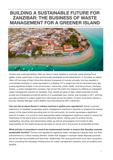Building a sustainable future for Zanzibar: The business of waste management for a greener island
Tourism and waste generation often go hand in hand, leading to improper waste disposal and plastic waste, particularly in less economically developed tourist destinations. In Zanzibar, an island 40km off the coast of East Africa that attracts thousands of tourists annually, this has resulted in uncontrolled dumping of waste equivalent to a Boeing 747's weight into the environment every day, posing significant threats to the environment, marine life, public health, and the economy. However, Zanrec, a waste management company, has turned this trash into treasure by offering an integrated waste management solution for Zanzibar. They handle all types of daily waste produced by both private and industrial/commercial sectors in a sustainable way. Zanrec was founded in 2011 and has secured contracts to collect waste from 100 hotels across the island. To learn more about Zanrec's journey, General Manager Justin Madho was interviewed by MTI investment´s Sara Svensson, student intern.
Can you tell us about Zanrec's mission and how it guides your operations?
Zanrec's primary objective is to establish sustainable waste management practices in Zanzibar to preserve the natural beauty of the island whilst providing jobs for the community. As tourism generates a significant amount of waste, it is crucial to have appropriate waste management systems in place to ensure the cleanliness of the island and to continue attracting visitors. Zanrec aims to achieve this by segregating, recycling, and repurposing waste, as well as encouraging more hotels to take responsibility for the waste produced and take an active role in the pursuit of sustainable tourism.
What policies or procedure's need to be implemented inorder to ensure that Zanzibar pursues sustainable tourism?
The law and regulations regarding waste management already exist, but their enforcement is a critical missing element. Hotels that engage in improper waste disposal practices should be held accountable and face fines. Additionally, the local government must take a proactive role in providing the necessary infrastructure for waste management systems, such as dustbins and landfills.
What are the opportunities that exist for Zanrec?
Currently, Zanrec collaborates with around 106 hotels, but with 700 hotels in Zanzibar, there are abundant opportunities for Zanrec to achieve its mission. Additionally, the recent launch of Sustainable Zanzibar, a booking portal that promotes ecotourism by featuring accommodations committed to green policies, will likely inceltivize more hotels to take actions to reduce their environmental impact.
What specific waste management services does Zanrec provide?
To accomplish our mission, Zanrec collects waste from a range of sources, including hotels, private villas, restaurant's and the community. The waste is sorted and processed for recycling at Zanrecs facility before, various organisation's collect the recycled waste and use it to create a diverse array of products, such as bags, drinking glasses, lamps, and many others products.
How does Zanrec work with local communities and stakeholders to ensure effective waste management practices?
Zanrec collaborates with diverse stakeholders to ensure the implementation of effective waste management practices. Engaging with the community constitutes a crucial aspect of Zanrec's work. By conducting educational programs for local schools, the organisation is able to raise awareness about the dangers associated with improper waste disposal for both the community and the environment. Additionally, Zanrec partners with the community to organise beach clean-up events and has established waste management collection points that are available for public use. Women play a crucial role in Zanrec's operations, as 75% of their workforce at the site is composed of women. Furthermore, through partnerships with organisation's that repurpose waste, Zanrec is able to create employment opportunities for local residents, particularly women.
According to Justin, waste management in Zanzibar, and in many other parts of East Africa, is beset by a range of challenges, such as insufficient infrastructure, inadequate resources, low levels of public awareness, and inadequate policies to promote sustainable tourism. Nonetheless, Zanrec offers a glimmer of hope that, with the right investments in waste management education and infrastructure, sustainable tourism can be achieved. This would not only safeguard the environment, marine life, public health, and the economy but also pave the way for a green future for the island of Zanzibar.
For additional information
Sara Svensson, student internt
[email protected]
Pontus Engström, CEO, MTI Investment SE
[email protected]
+46 70 716 55 38
About MTI Investment SE
MTI Investment SE is a Nordic investment and venture-building company, founded in 2014 by a team with extensive experience in emerging markets to invest in East African small and medium-sized enterprises ("SMEs") with high value-adding potential. The Company is active in the expansive East African market, and by being a long-term and active owner, MTI Investment helps its portfolio companies grow faster and become more profitable. The Company invests primarily in innovative and scalable companies that have the potential for a significant positive impact on society.
The MTI Investment share (MTI) is traded on the Nasdaq First North Growth Market.
Certified Adviser to MTI Investment is Mangold Fondkommission AB.
Read more on: www.mti-investment.com
Om MTI Investment
Prenumerera
Få löpande information från MTI Investment via e-post.
